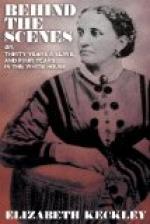My boss, as I remember him, was a tall, raw-boned man, but rather distinguished in looks, with a fine carriage, brilliant in intellect, and considered one of the wealthiest and most successful planters of his time. Mrs. McGee was a handsome, stately lady, about thirty years of age, brunette in complexion, faultless in figure and imperious in manner. I think that they were of Scotch descent. There were four children, Emma, Willie, Johnnie and Jimmie. All looked at me, and thought I was “a spry little fellow.” I was very shy and did not say much, as everything was strange to me. I was put to sleep that night on a pallet on the floor in the dining room, using an old quilt as a covering. The next morning was Christmas, and it seemed to be a custom to have egg-nog before breakfast. The process of making this was new and interesting to me. I saw them whip the whites of eggs, on a platter, to a stiff froth; the yolks were thoroughly beaten in a large bowl, sugar and plenty of good brandy were added, and the whites of the eggs and cream were then stirred in, a little nutmeg grated on top of each glass when filled for serving. This was a delicious drink, and the best of all was, there was plenty of it. I served this to all the family, and, as there were also visiting relatives present, many glasses were required, and I found the tray so heavy I could hardly carry it. I helped myself, after the service was finished, and I was delighted, for I had never tasted anything so fine before.
My boss told me I was to wait on the madam, do any errand necessary, attend to the dining room—in fact I was installed as general utility boy. It was different from the quiet manner of life I had seen before coming here—it kept my spirits up for some time. I thought of my mother often, but I was gradually growing to the idea that it was useless to cry, and I tried hard to overcome my feelings.
* * * * *
Plantation life.
As already stated, it was Christmas morning, and, after breakfast, I saw the cook hurrying, and when I went out into the yard, everywhere I looked slaves met my view. I never saw so many slaves at one time before. In Virginia we did not have such large farms. There were no extensive cotton plantations, as in Mississippi. I shall never forget the dinner that day—it was a feast fit for a king, so varied and lavish was the bill of fare. The next attraction for me was the farm hands getting their Christmas rations. Each was given a pint of flour of which they made biscuit, which were called “Billy Seldom,” because biscuit were very rare with them. Their daily food was corn bread, which they called “Johnny Constant,” as they had it constantly. In addition to the flour each received a piece of bacon or fat meat, from which they got the shortening for their biscuit. The cracklings from the rendering of lard were also used by the slaves for shortening. The hands were allowed four days off at Christmas, and if they worked on these days, as some of them did, they got fifty cents a day for chopping. It was not common to have chopping done during the holidays; some planters, however, found it convenient thus to get it out of the way for the work which came after Christmas.




